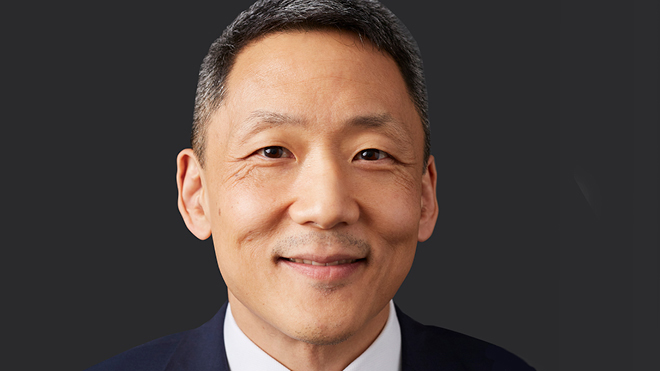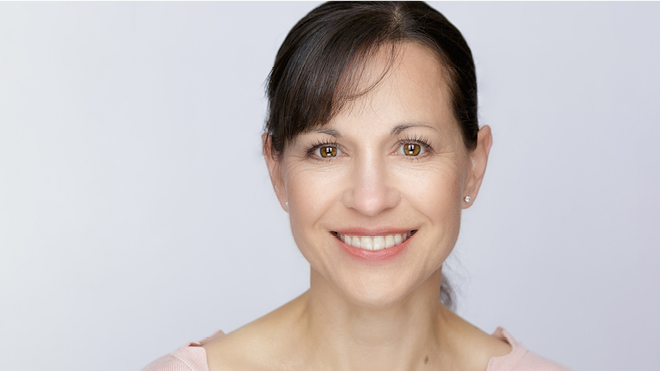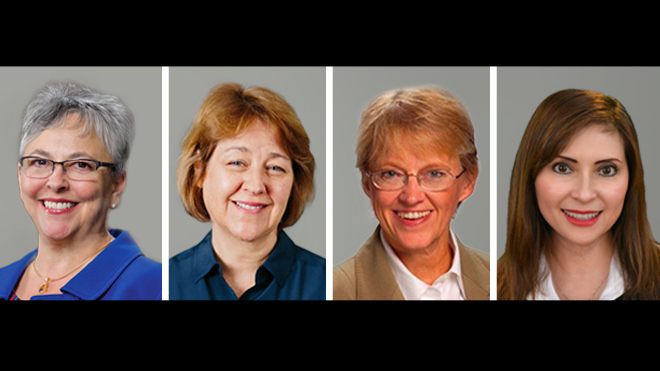
Road to Financial Health 'Takes a Village'
Pauline Hernandez's parents worked hard to provide a good life for their family, but they didn't teach her about money. Now in a successful financial career, she is driven to share her knowledge to improve her community's financial well-being.
Looking back on her childhood, Pauline Hernandez is a little surprised by her path to a successful career in finance. Now in her 28th year in the banking industry, Hernandez is the manager of a BECU neighborhood financial center.
But when she was growing up, she didn't know anything about money, and her personal financial education involved a lot of trial and error.
Financial Challenges as Immigrants
When Hernandez was 5, her parents moved their family from the Philippines to the U.S. They wanted opportunities to earn more money and provide a comfortable life for their children.
In the Philippines, her father was an engineer, her mother a nurse, but their professional credentials weren't fully recognized in the U.S.
"They had to start at the bottom," Hernandez said. "It was a bumpy ride for them."
The family settled in San Francisco and, to make ends meet, her father got a job with the city, working a day shift. Her mom worked a graveyard shift as a certified nursing assistant so she could take care of Hernandez and her sister during the day.
"She would come home after working a graveyard shift and take us to school," Hernandez said. "My parents' philosophy was you do what you can and all that you can to provide."
At the time, though, Hernandez didn't realize how tough things were for her parents.
"Even though they were scraping, we always had food on the table and a roof over our heads," she said. "They sent us to private school because they wanted to make sure we had a good education."
Money Wasn't Discussed
In her family, the topic of money was taboo. Hernandez thinks it's partly because her parents didn't know much about personal finance in their new country. They were so focused on providing for family members locally and back home in the Philippines that they didn't have time to learn about managing their finances.
She also thinks cultural and generational differences were factors. As head of the family, her father felt responsible for managing family finances himself.
These days, her father has started turning to her for her advice more often.
"My dad is in a different place now," she said. "He comes to me for advice and expresses pride in me for doing well. It's a little emotional when I think about it, because in my family, that doesn't happen often."
Falling Into Banking
While she was in her final year of high school, Hernandez found a teller job with a bank — and that was the beginning of her long and successful career.
"I just fell into it," Hernandez said. "It was a good job, a good profession, and it kept me busy while I was going to school."
She and her husband married when she was 18 and moved from San Francisco to Colorado Springs, Colorado, to raise their new family. Hernandez got another job as a teller, and her husband worked in the restaurant industry.
Nine years ago, she joined BECU in Washington state. Her husband, who transitioned to banking 16 years ago, works on the BECU mortgage team.
"It was great for us. Banking allowed us to learn and grow and help people while providing for our family," Hernandez said.
BECU has become a bit of a family tradition, with their adult son now serving as a BECU member consultant.
Encountering Racism
Hernandez enjoyed being immersed in her Filipino culture growing up and felt comfortable in San Francisco, a diverse community where she was among many Filipino people.
It wasn't until she had a family of her own and was living in Colorado that she felt the effects of racism.
In one situation, another teller was trying to help a customer solve a problem. The teller asked the customer who had helped him the last time he was at the bank. The man raised his voice, pointed at Hernandez, the only non-white teller, and said: "That foreigner over there."
"That set the tone for me," Hernandez said. "And it wasn't only about race. I was also a young woman of color in the financial industry. It has been hard to speak up for myself."
Barriers to Career Growth
Life was busy with two children, so Hernandez put college on hold. But she worked hard and gained experience that helped her advance in her career, to a point.
Hernandez had set her sights on becoming a manager. She had been with the bank for 10 years, working up from being a personal banker to training other employees to become personal bankers, but she was told she couldn't become a manager without a college degree.
She accepted that answer until one of her trainees, a white man about 10 years her senior, decided he wanted to be a business banker, a role that also required a degree that he didn't have. He applied and got the position.
"It was a slap in the face for that person, who didn't have a degree, to get that role when he applied for it," she said. "I realized they were just handing me excuses."
She started looking for jobs elsewhere.
She also went back to school. It took eight years of balancing work, family, volunteering and her studies. In 2020, she earned her bachelor's degree in Communications with a minor in Religious Studies from Regis University in Denver.
Shared Challenges
Hernandez's experience of facing greater challenges based on her race and gender is borne out by statistics. The higher the position on the finance career ladder, the more positions held by men. In finance, women earn 77 cents for every dollar earned by men, and the gap widens for women of color.
Statistics about Asian Americans, as a whole, are deceiving because they describe a more highly educated population with higher median incomes than any other racial group in the U.S. But those numbers mask the enormous wealth gap within the range of cultures categorized as Asian and Pacific Islander. Asian Americans with the top 10% of income earn 11 times as much as Asian Americans in the bottom 10%, according to Pew Research.
Asian Americans, especially Asian American women, are also the least likely group to be promoted to management, according to a McKinsey & Company report.
Racial Identity and Labels
Hernandez sees pros and cons to the broad categorization of races. Racial labels often don't account for the range of ethnicities and cultures they are meant to represent, and there is variation within cultural groups in how individuals identify. Hernandez and her sister have, for example, differed on whether they identify as Asian or Pacific Islander.
But it helps to come together with others who have similar cultural backgrounds and shared experiences. Hernandez finds support by participating in a BECU employee resource group (ERG) for Asian Americans, Native Hawaiians and Pacific Islanders. BECU has 10 ERGs for employees with common interests to come together to support each other, build community, share concerns and identify solutions that further the mission, vision and values of BECU.
"Within the ERG, we celebrate all the different cultures, but we find more common ground than anything else," Hernandez said. "It helps having the community at BECU and knowing we're not alone."
Sharing Knowledge, Supporting Community
After growing up knowing very little about personal finance and landing in a financial career, Hernandez was determined to pass on her knowledge to her family and her community.
She and her husband talked to their two children, now grown, about bank accounts, saving money and building credit throughout their childhoods. They opened bank accounts for their kids as soon as they were able to understand what they were and had them apply for credit cards when they turned 18. By their mid-20s, both of their children had their own auto loans, without their parents as co-signers.
"The kids educate their friends and the people they know and tell them what they experienced with two parents in finance," Hernandez said.
In addition to educating her own children, Hernandez was a devoted Eagle Scout merit badge counselor for 20 years. She was most active in Colorado Springs Troop 2, where she taught scouts a variety of subjects, including managing personal finances. She taught them how to budget, how to handle checking and savings accounts, how to establish and maintain good credit, how interest rates work, good spending habits, investments, insurance and career planning.
"I took great pride and loved being a scouter and merit badge counselor," Hernandez said. "It not only allowed me to teach many boys what they need to do to be good stewards of our community, nation and world, but also good stewards of their money and their lives in order for them to be good, responsible and upstanding adults."
Carrying on her family's tradition of supporting communities in the Philippines, Hernandez led an effort through BECU to repurpose BECU logo gear by giving clothes and other items a new home there. Now she ships boxes of BECU gear to the Philippines a couple of times a year.
Changing Attitudes and Systems
For Hernandez, having a successful career comes with a sense of responsibility for improving conditions for future generations.
She tries to be a mentor and to represent what is possible, especially for women of color.
"It's important to me to show other people that someone who looks like them can be in this role," she said. "It's also important for our members to see someone who looks like them, so they know the credit union is a place where they belong."
In addition to representation, Hernandez believes it's important to provide culturally appropriate services. One of the main ways a credit union can do that is through language. Hernandez is pleased that BECU is piloting Spanish language programs and hopes to see those services expanded into additional languages.
One of the biggest life lessons Hernandez has learned along the way is that changing systems and attitudes isn't the work of one person in isolation. It takes asking for help when you need it and giving help where and when you can.
"Our family and friends are here for us, and we need to know we can go to them to seek support," Hernandez said. "It's hard for people to swallow their pride and ask for help. They think they have to be able to do everything themselves. But it's important to know you're not alone. It takes a village."
The above article is intended to provide generalized financial information designed to educate a broad segment of the public; it does not give personalized financial, tax, investment, legal, or other business and professional advice. Before taking any action, you should always seek the assistance of a professional who knows your particular situation when making financial, legal, tax, investment, or any other business and professional decisions that affect you and/or your business.


